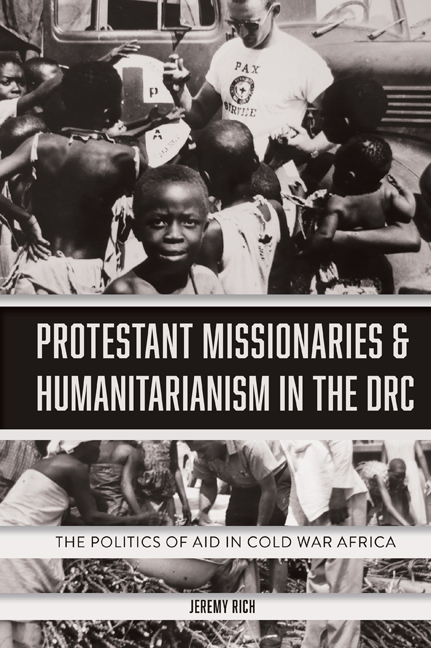Book contents
- Frontmatter
- Contents
- List of Illustrations
- Acknowledgements
- List of Abbreviations
- Introduction
- 1 The CPRA, Protestant Missions, and the Congo Crises, 1960–1965
- 2 The CPRA and Luba Refugees in South Kasai, 1960–1962
- 3 The CPRA and Angolan Refugees in the DRC, 1961–1967
- 4 The CPRA and the Simba Revolts, 1964–1967
- 5 Operation Doctor: The Rise and Fall of a Protestant Short-Term Medical Volunteer Programme
- 6 Protestant Volunteers and Medical Practice in the Congo in the 1960s
- 7 Changing Dollars into Zaires: The Challenges of a Humanitarian Aid NGO in the DRC, 1965–1973
- 8 The Centre for Community Development
- Conclusion
- Bibliography
- Index
8 - The Centre for Community Development
Published online by Cambridge University Press: 11 September 2020
- Frontmatter
- Contents
- List of Illustrations
- Acknowledgements
- List of Abbreviations
- Introduction
- 1 The CPRA, Protestant Missions, and the Congo Crises, 1960–1965
- 2 The CPRA and Luba Refugees in South Kasai, 1960–1962
- 3 The CPRA and Angolan Refugees in the DRC, 1961–1967
- 4 The CPRA and the Simba Revolts, 1964–1967
- 5 Operation Doctor: The Rise and Fall of a Protestant Short-Term Medical Volunteer Programme
- 6 Protestant Volunteers and Medical Practice in the Congo in the 1960s
- 7 Changing Dollars into Zaires: The Challenges of a Humanitarian Aid NGO in the DRC, 1965–1973
- 8 The Centre for Community Development
- Conclusion
- Bibliography
- Index
Summary
The late 1960s marked a new era for the Democratic Republic of Congo and the CPRA. General Mobutu Sese Seko toppled the government of Moïse Tshombe and Joseph Kasavubu in November 1965 in the name of restoring order and economic growth. The escalating Vietnam war drove up US demand for copper and other mineral resources that abound in the DRC. As copper prices rose, so did the revenue of the Congolese state. The humanitarian crises of the first five years of Congolese independence gradually improved, particularly after Mobutu pitilessly disposed of political rivals. The rhetoric of crisis, so engraved in CPRA projects in the first of half of the 1960s, no longer accurately corresponded with conditions on the ground.
This chapter is a case study of a CPRA emergency relief programme that transformed into an African-led development effort: the Centre for Community Development (CEDECO). This case shows how blurred the separation was between humanitarian relief and development programmes in the DRC in the 1960s. The evolution of this project reveals the shift from emergency assistance to new goals: self-sufficiency and eliciting the perspectives of Angolan refugees and Congolese. Unlike many of Mobutu's programmes, CEDECO relied on low-cost and low-tech solutions. As CEDECO's name indicates, the project was an example of small-scale community development, an ideal of some Western development personnel.
Community development offered an alluring ideal of harmonious rural communities working with foreign experts to adapt Western technical innovations to their own needs. Its proponents rejected costly development projects that drove Cold War modernisation programmes. Yet community development had its own blind spots. Daniel Immerwahr has noted: ‘What community development overlooked was power: power within communities and power relationships between communities and the larger society around them.’ CEDECO staff made no effort to transform local power relations. Not surprisingly, Congolese officials voiced their approval of CEDECO's projects, since it did not threaten the government's grip on power. The CEDECO case suggests that the Congolese state could ignore agriculture by permitting NGOs to take on this burden themselves. Community development’s emphasis on building peaceful relationships through technology transfer thus resonated with Congolese and North American stakeholders.
- Type
- Chapter
- Information
- Protestant Missionaries and Humanitarianism in the DRCThe Politics of Aid in Cold War Africa, pp. 205 - 227Publisher: Boydell & BrewerPrint publication year: 2020

